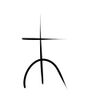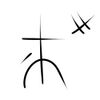Contionary:cé: Difference between revisions
Jump to navigation
Jump to search
No edit summary |
|||
| (44 intermediate revisions by 2 users not shown) | |||
| Line 1: | Line 1: | ||
==Soc'ul'== | |||
===Etymology 1=== | |||
{{wacag|man}} | |||
{{qsc-inh|kəː|kē'-que<c:kē'->}} {{cog|qsc|kisl|gëkwë³}} Doublet of {{l|qsc|cóc}} | |||
===Pronunciation=== | |||
* {{IPA all|qsc|[kəː˥˧]}} | |||
===Noun=== | |||
{{qsc-n|2|céce}} | |||
# man {{g|masculine human}} | |||
#: {{ux|qsc|Haruc' '''cé'''.|The '''man''' saw me.}} | |||
# {{lb|qsc|possessed}} father | |||
#: {{ux|qsc|Añ'jeiñño '''cé''' teúx.|The deer's '''father''' ran away.}} | |||
===Interjection=== | |||
{{head|qsc|interjection}} | |||
=== | |||
# ''Exclamation to get attention''; hey, ey, oi | |||
#: {{ux|qsc|'''Cé''', xen cuuc' il xad?|'''Hey''', where have you been?}} | |||
=== | ===Derived terms=== | ||
{{col-auto|qsc|cñ'ucé|un' xíc' āhleyaxiý c'uatxañ' cé c'uau c'uau āhr'u xenuz c'ualdocuóc hé}} | |||
===Etymology 2=== | |||
{{wacag|strong}} | |||
{{qsc-inh|kəːsuʃ|kē'-cosc<c:kē'->}} {{cog|qsc|kisl|kētsu}} | |||
===Adjective=== | ===Adjective=== | ||
{{head|qsc|adjective}} | |||
# strong | # strong, powerful, mighty | ||
#: | #: {{ux|qsc|Añ''''cé'''jí xañ'eux.|The gorilla is '''strong'''.}} | ||
===Synonyms=== | |||
{{sense|man}} | |||
{{col-auto|qsc|cóc}} | |||
{{sense|father}} | |||
{{col-auto|qsc|cóc|mama}} | |||
{{sense|strong}} | |||
{{col-auto|qsc|céux|etn'}} | |||
===Descendants=== | |||
*{{desc|loxw|kee}} | |||
*{{desc|soky|ke⁵³}} | |||
Latest revision as of 15:05, 9 February 2026
Soc'ul'
Etymology 1
| Wacag logograph |
|---|
 |
From Sekhulla kəː, from Wascotl *kē'-que. Cognate to Kilīmos-sāîl gëkwë³. Doublet of cóc
Pronunciation
Noun
cé 2 (plural/indefinite céce)
- man (masculine human)
- Haruc' cé.
- The man saw me.
- (possessed) father
- Añ'jeiñño cé teúx.
- The deer's father ran away.
Interjection
cé
- Exclamation to get attention; hey, ey, oi
- Cé, xen cuuc' il xad?
- Hey, where have you been?
Derived terms
Etymology 2
| Wacag logograph |
|---|
 |
From Sekhulla kəːsuʃ, from Wascotl *kē'-cosc. Cognate to Kilīmos-sāîl kētsu.
Adjective
cé
- strong, powerful, mighty
- Añ'céjí xañ'eux.
- The gorilla is strong.
Synonyms
(man):
(father):
(strong):